Fishing is one of Keith English’s passions. “If it swims,” says English,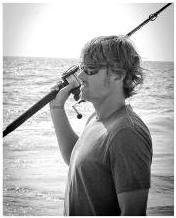 owner of the Wanchese 68, Click Through, homeported in Pensacola, Florida, “I want to catch it.”
owner of the Wanchese 68, Click Through, homeported in Pensacola, Florida, “I want to catch it.”
Born outside of Atlanta, Georgia, English’s family moved often throughout his childhood, but it was visits to his grandfather, who lived in Pensacola, that launched in him a fervor for fishing.
“There are pictures of me at age 2 and 3 sitting on my grandfather’s boat and fishing with him in the surrounding lakes and rivers,” he says.
The two would fish for trout, redfish and flounder. English’s grandfather didn’t head offshore, except for some bottom fishing.
This early enthusiasm for fishing followed English wherever he went.
“My mother spent countless hours driving me to ponds and lakes,” he says. “Fishing was the focal point of all my recreational activity. I spent a lot of time either thinking about fishing, anticipating fishing or planning a trip. Even when I played baseball in college, I’d take my fishing rods on away trips and then find the nearest pond to the hotel where we stayed.”
In spite of an avid love of baseball, and a stint as a professional ball player, English never ventured too far, or too long, from the water and his love of angling.
“Fishing is something that requires regular diligence, patience and certain ability,” he says. “It’s a sport that I could do on my own or with others in all forms and facets. That’s what I love about it.”
English began venturing offshore when he attended the University of North Carolina in Charlotte, where he ultimately graduated with a degree in financial management.
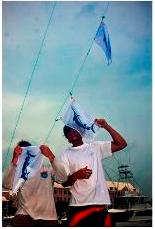 “There was a group of us guys that started mackerel fishing and then moved up to larger boats and would go out for tuna, dolphin, wahoo and the occasional marlin,” he says.
“There was a group of us guys that started mackerel fishing and then moved up to larger boats and would go out for tuna, dolphin, wahoo and the occasional marlin,” he says.
In 1999, English was offered a position and the opportunity to move to Pensacola.
“I had a 19-foot center console at the time,” he says. “We went to insane places, places you shouldn’t go in a boat of that size like 40 to 50 miles offshore with no radar. But, my friends and I loved to explore both the in-shore and offshore waters.”
English caught his first blue marlin off Marathon, in the Florida Keys, off that 19-footer.
“We were out trolling, saw birds diving on baits and up came a 125 to 130 pound blue marlin. We were rigged for sailfish with 4/0 reels and as I reeled the marlin in the reel actually imploded because the line wound on so tightly. We didn’t know what we were doing back then. For example, we sat dead still in the boat…didn’t know to back down. It was a totally unintended catch and I remember it well,” he says.
English started spending more and more time on the water. This was especially so after his buddy, Capt. Casey Hyman, started helming the 52-foot Viking, Plumb Crazy, and the owner began inviting English out on a regular basis, both for fun and tournament fishing.
In 2005, English bought a 35-foot Cabo, a craft that gave him the ability to go offshore himself. He continued spending countless hours on the water and soaking up as much fishing knowledge as he could. A year later, his sights were firmly focused on billfish, particularly blue marlin.
“It’s a progression, that’s what draws you on,” he says. “You catch a fish of one size and you want to catch the next and the next size bigger. Catching that blue marlin back in the 1990’s opened my eyes. Marlin were not just a picture in a magazine anymore, but something real, something in which I had my own experience.”
English started traveling the world in search of blue marlin. At the end of 2008 he bought Click Through, and put time and money into customizing the vessel for top of the line angling. This included making the mezzanine more comfortable, as English doesn’t go inside while out fishing, and adding a store of teaser reels; teaser fishing isn’t something he did in the Gulf.
“I really enjoy pitch baiting – the bite, the greater angler interaction with the process, and the fight,” he says.
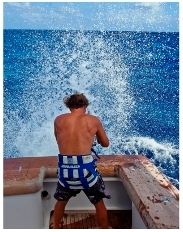 He also prefers to use 30- to 50-pound test and stand-up angle rather than fighting from a chair.
He also prefers to use 30- to 50-pound test and stand-up angle rather than fighting from a chair.
“We plan a year in advance and design our travel schedule to put the hottest fishing spots on this side of the world on our calendar,” he says.
Last year, English and he crew fished the first part of the year in Panama and Costa Rica. Then, it was on to the Big Rock Tournament in North Carolina and Bermuda in July where Click Through won the Bermuda Triple Crown. Next up was fishing the USVI Open/Atlantic Blue Marlin Tournament in St. Thomas, where Click Through lead day one with three blue marlin releases.
“We fish equally hard whether we’re fun fishing or tournament fishing,” says English. “But, I do like the competition of tournament fishing. You always see the same boats in the top. In St. Thomas, that’s Revenge, Big OH, Sandman and Marlin Prince. It’s a good way to test skills and knowledge against other boats that are good at what they do. Then, we use the fun days of fishing to get better.”
English used his fun fishing days last summer in a very unique way, and one that most anglers would find extremely difficult to do. He invited professional photographer, Marc Montocchio, to come out and attempt to get an extremely rare and coveted photo of a free-swimming blue marlin. This required Montocchio to jump in the water with his camera equipment and for English and his crew to tease up marlin to the back of the boat, but not to hook the fish. Montocchio tried to accomplish this extreme feat in Bermuda and St. Thomas and succeeded in Virgin Islands’ waters.
“It was pretty impressive seeing how the marlin reacted in their natural state,” says English.
What about missing all those bites?
“If I only fished 5 to 10 days a year, that would have definitely been hard, but we fish 75 to 90 days a year so that provides lots of other opportunities,” he says.
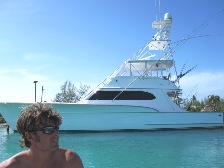 In 2011, English plans to winter in the Bahamas where he’ll fish off Crooked Island and San Salvador until April when he returns to Florida for the cobia migration. In May, it’s back to North Carolina and June to Bermuda. Then, he’ll leave the boat behind and fly to Russia in August where he’ll go fly fishing in mountainous regions that have never been fished before. Fly fishing is a love he developed on a trip to Alaska four years ago. Finally, English will take Click Through to Venezuela from September to November, transit the Panama Canal and ring in the New Year fishing once again in the Pacific.
In 2011, English plans to winter in the Bahamas where he’ll fish off Crooked Island and San Salvador until April when he returns to Florida for the cobia migration. In May, it’s back to North Carolina and June to Bermuda. Then, he’ll leave the boat behind and fly to Russia in August where he’ll go fly fishing in mountainous regions that have never been fished before. Fly fishing is a love he developed on a trip to Alaska four years ago. Finally, English will take Click Through to Venezuela from September to November, transit the Panama Canal and ring in the New Year fishing once again in the Pacific.
Does he have a particular fishing goal in mind?
“Not really,” English says. “However, Bermuda and Panama are certainly opportunities for granders and that opportunity is always part of the conversation. Where we go includes places we like as well as places that are good for fishing. For example, my wife and son enjoy Bermuda.”
While not planned for, English did catch every species of billfish while aboard Click Through in 2010. “We got the spearfish in Bermuda and that’s generally the biggest challenge. The striped marlin came in Panama and the black marlin too. We were fortunate to have this happen.”
The first black marlin English ever caught was off Costa Rica. It’s one of his best fish stories. He was angling from the local charter boat, Gear Up, and they were targeting sailfish when a 500 to 600 pound blue marlin came up.
“We didn’t have a chance of catching it because of the sailfish gear,” he says, “but we did anyway.”
The big black came up; hit the baits and 45 minutes later had never dove but stayed on top and within a 100 yards of the boat. When the fish zigzagged under the vessel and circled 60 yards of line in a loop, the mate was able to reach down, grab the leader and pop off a release.
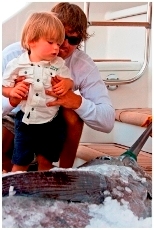 English looks ahead to the horizon of the sport. “It’s imperative that sports fishermen have a voice in conservation measures. Over the last 10 to 15 years conservation efforts have become a lot better and captains have become more aggressive and fishing equipment and techniques have improved to allow for faster releases. It would be great to move to all-release tournaments. Instead of looking at dead fish on the dock, sophisticated video systems in the future could play footage of exciting catch and releases. The more people get excited about the sport, the more they will clamor for conservation.”
English looks ahead to the horizon of the sport. “It’s imperative that sports fishermen have a voice in conservation measures. Over the last 10 to 15 years conservation efforts have become a lot better and captains have become more aggressive and fishing equipment and techniques have improved to allow for faster releases. It would be great to move to all-release tournaments. Instead of looking at dead fish on the dock, sophisticated video systems in the future could play footage of exciting catch and releases. The more people get excited about the sport, the more they will clamor for conservation.”
The future is definitely important to English. After all, fishing is a family tradition that he intends to foster into the next generation.
“I travel a lot,” says English, who when not fishing works in venture capital, “and every time I go out the door my two-year-old son tells me to go catch a marlin. It’s pretty funny. But, he’s already fishing for red fish off our dock with a little set up I made for him.”
